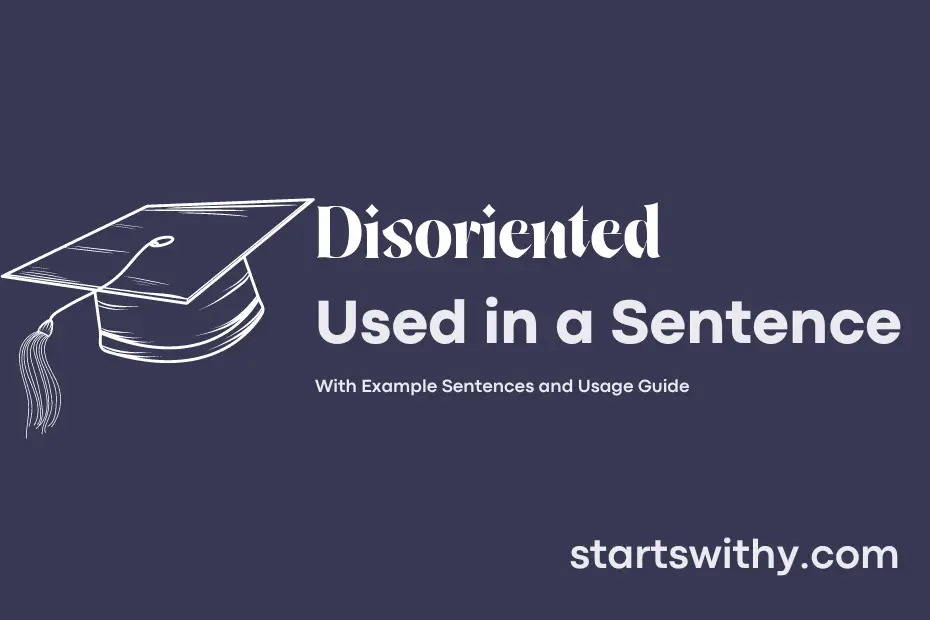Have you ever felt confused or lost, unable to make sense of your surroundings? That feeling of being disoriented, where everything seems unfamiliar and out of place, can be quite unsettling.
Being disoriented is the state of being confused or lost, often due to a lack of familiar landmarks or clear direction. It can leave you feeling discombobulated and unsure of where to go or what to do next.
7 Examples Of Disoriented Used In a Sentence For Kids
- Disoriented means feeling lost or confused.
- Sometimes when we spin around too fast, we can feel disoriented.
- If you close your eyes and then open them in a different place, you might feel disoriented.
- When we wake up in the middle of the night, we can feel disoriented for a moment.
- If we go to a new place without a map, we might become disoriented.
- When we play a game blindfolded, we can become disoriented.
- It’s important to stay calm if we ever feel disoriented.
14 Sentences with Disoriented Examples
- Disoriented, the students looked around the crowded college campus, trying to find their way to the lecture halls.
- The large library left many students feeling disoriented as they tried to navigate through the stacks of books.
- Disoriented by the sudden change in their timetable, the students frantically checked their phones for updates.
- The overwhelming amount of assignments had the students feeling disoriented about where to even begin.
- Disoriented by the complex equations on the whiteboard, the students exchanged confused looks with each other.
- The noisy construction outside the college made it easy for students to feel disoriented during classes.
- Disoriented by the new online learning platform, many students struggled to submit their assignments on time.
- The unfamiliar cafeteria menu left the students feeling disoriented as they tried to decide what to order for lunch.
- Disoriented by the lack of guidance from their professors, the students turned to each other for help with their projects.
- The sudden power outage in the middle of an exam left the students feeling disoriented and unsure of what to do next.
- Waking up late and rushing to class, the students felt disoriented as they tried to catch up on the lecture notes.
- Disoriented by the multiple extracurricular activities they had signed up for, the students struggled to balance their time effectively.
- The confusing campus map had many new students feeling disoriented as they tried to find their way to their dorm rooms.
- Disoriented by the sudden change in weather, the students scrambled to find their umbrellas before heading to their next class.
How To Use Disoriented in Sentences?
To use the word Disoriented in a sentence, simply follow these steps:
-
Understand the meaning of Disoriented: Disoriented means to feel confused, lost, or unable to determine your position or direction.
-
Identify the context: Think about a situation where someone may feel confused, lost, or out of place. This could be due to being in an unfamiliar location, experiencing a sudden change, or feeling overwhelmed.
-
Construct a sentence: Incorporate the word Disoriented into your sentence to accurately convey a feeling of confusion or being lost. For example, “After the car accident, she felt disoriented and couldn’t remember how she ended up on the side of the road.”
-
Check the sentence for clarity: Make sure that the sentence effectively communicates the sense of being confused or lost. Ensure that the context surrounding the use of Disoriented helps to enhance its meaning.
-
Practice using Disoriented in different sentences: To become more comfortable with using the word Disoriented, practice incorporating it into various sentences to strengthen your understanding of its meaning and usage.
By following these steps and practicing the use of Disoriented in a sentence, you will be able to effectively communicate feelings of confusion or disorientation in your writing.
Conclusion
In conclusion, the examples of disoriented sentences presented here showcase a state of confusion or lack of direction. Whether due to physical disorientation like being lost, disoriented in thought, or in the midst of a chaotic situation, these sentences reflect instances where clarity and stability are compromised. Through these examples, it becomes evident that feeling disoriented can arise from various circumstances and can be a common human experience.
By highlighting the prevalence and diverse nature of disorientation in the sentences shared, it is clear that this state is a relatable and transient condition that can result from a multitude of factors. From disorientation caused by physical dislocation to mental confusion or emotional turmoil, the examples provided offer insight into the different ways this feeling can manifest in our daily lives.



